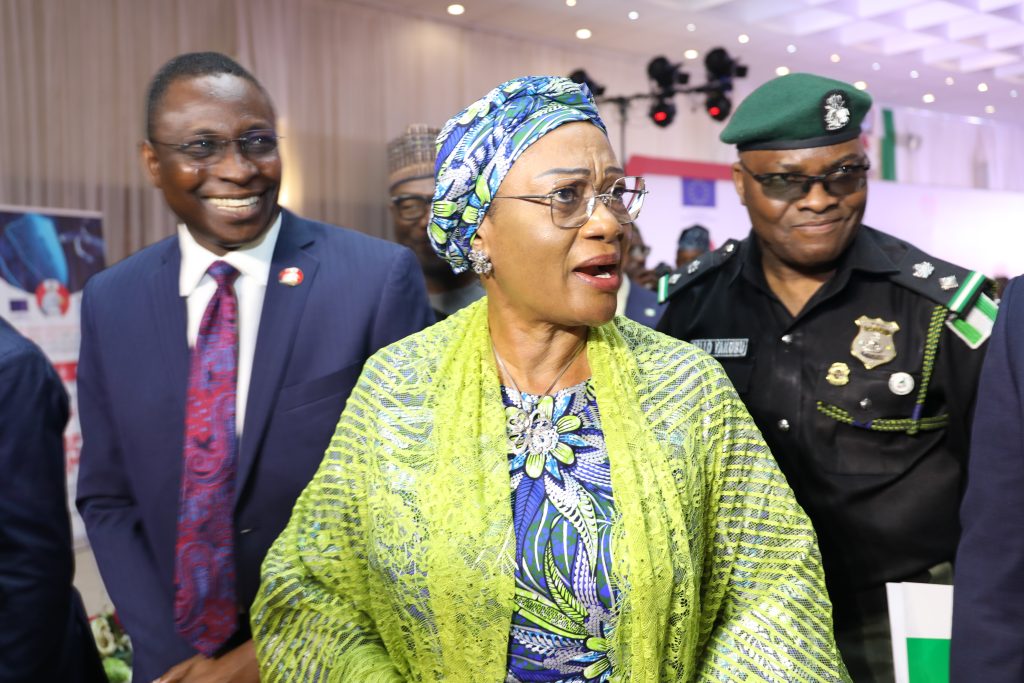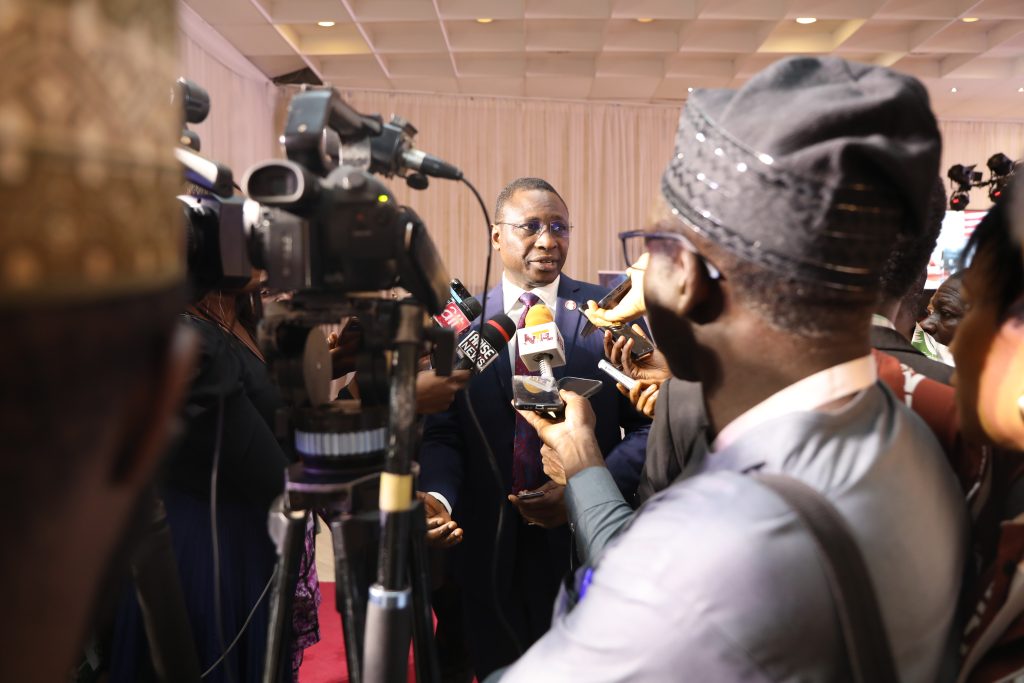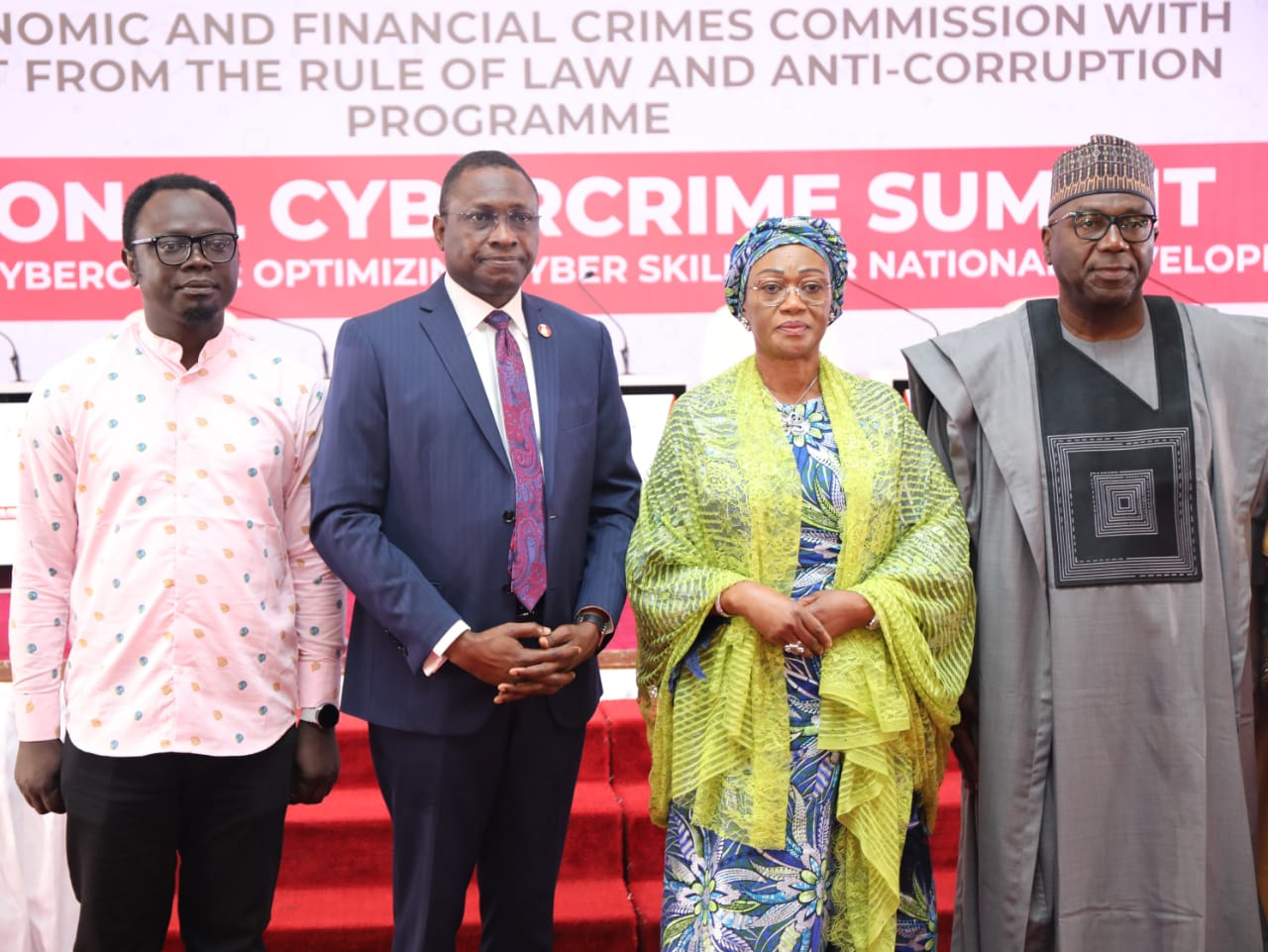Maureen Okpe
Nigeria’s First Lady, Senator Oluremi Tinubu, some. state governors, religious and traditional leaders, the EU-funded Rule of Law and Anti-Corruption (RoLAC II) Programme of International IDEA, and other stakeholders have rallied support for the Economic and Financial Crimes Commission (EFCC) was against cybercrimes in Nigeria
This support came in the wake of the one-day National Cybercrime Prevention Summit which was held in Abuja on Tuesday, organised by the EFCC with the support of the European Union-funded Rule of Law and Anti-Corruption (RoLAC II) Programme of the International IDEA, with the theme: Alternative to Cybercrimes: Optimising Cyber Skills for National Development.
The stakeholders harped on the need for all to support the anti-graft agency’s bid to eradicate crimes associated with internet technologies and to find lasting solutions to the increasing menace of cybercrime in the country.
Speaking at the occasion, the Chairman of the Nigeria Governors Forum (NGF) and Governor of Kwara State, AbdulRahman AbdulRazaq, commended the Commission and other anti-crime agencies for their efforts in dissuading the minds of youths against crime and assured of the support from the governors.
“I am impressed with what EFCC, NDLEA and the National Orientation Agency are already doing in the new media and in our basic schools to dissuade the minds of our young people on the issues of crimes, drug abuse and patriotism. This effort should be taken to another level so that we may have a national consensus on what behaviours constitute our irreducible cultural legacy as Nigerians.
“You have our support in this regard. In addition, we commend the EFCC and the efforts they are making by putting this gathering together once again. And I am sure after this summit, we will all leave here better informed and geared towards improving the perceptions on cybercrime” the NGF chairman said.
Also speaking, the Governor of Zamfara State, Mr Dauda Lawal, observed that the issue of cybercrime is not one to be left alone to the EFCC and other anti-graft agencies.
Responding to why he was declaring support for the Commission when some of his counterparts are already challenging the legality of the EFCC at the Supreme Court, Lawal, who denied knowledge of such a suit, said he has no reason to be scared of the Commission because he has made accountability and transparency his watchword.
“Why will I be scared of the EFCC, we are here to serve and this is the way forward, people should be accountable, people should be transparent that is the way, that is leadership”, he said
“My coming here is to give my support to the Commission especially in times like this when Nigeria is facing so many challenges that have to do with cybercrime this is a very good opportunity and I believe this is the way forward so that we can redeem the image of Nigeria in the comity of nations”, he added.
Earlier, EFCC’s Chairman Mr Ola Olukoyede, pointed out that the menace of cybercrimes, like most economic and financial crime, is a burning challenge that cannot be denied, ignored or wished away.
He observed that the summit, which is the second to be organised by the Commission this year on the same issue, is due to the overarching need for stakeholders to articulate opinions and build greater strength against the scourge of cybercrimes.
“This time around, we are not only interrogating the problem, we are aggregating workable solutions to it.
“ The enormity of challenges posed to us as individuals and nation by cybercrimes are grievous. As individuals, youths’ involvement in these crimes is distorting and corrupting acceptable family values. The tendency towards quick riches no longer positions our young people for enterprise, resourceful intellectual aspirations and technological innovations”, he said.
The chairman disclosed that projections by multiple sources showed that the global loss to cybercrimes may reach a staggering $10.5 trillion by 2025, with approximately 2,328 cases occurring daily, adding that the implication of all these is that, if left unchecked, cybercrimes portend grave dangers to the entire world.
Besides, Olukoyede stated that cybercrime threatens the nation’s most significant asset – its reputation and economic well-being, adding that the losses by the financial services sector to cybercrime in the last three years are staggering.
“ We cannot continue to sit idly and watch the integrity of our institutions compromised and our youths degenerate into uselessness. The future of our nation cannot and would not be allowed to hang in the balance. We must take collective action against cybercrimes.
“Talking about alternatives to cybercrimes, there are ample skills that can be optimized for national development. It is this lack of serious cogitation on the alternatives that have not made our youths shift their focus from criminal tendencies. First, there is the alternative of creative and innovative development of socially beneficial applications that can deliver better prospects than internet fraud.
“ Today’s event is tailored towards exposing young Nigerians with strong tech skills to the opportunities that abound in various industries and sectors for legitimate wealth creation and honest livelihood. These opportunities can be found in the creative industry, tech ecosystem, financial services sector, medical services and even law enforcement”, he added.
Photo Highlights






In goodwill, the Head of the Programme of the International Institute for Democracy and Electoral Assistance (International IDEA), Mr Danladi Plang, observed that, as technology progresses, reliance upon it has escalated, increasing cybercrime.
“Nigeria has a very youthful population, that is versatile in the use of technology. This skill has been used negatively in various forms including in digital financial crime. This has not only given the country a bad name internationally but also a significant threat to the country’s financial system and increased crimes against the person, including child pornography.
“While we acknowledge the effort made by the EFCC and other law enforcement agencies (LEAs) in fighting cybercrime; perhaps we need to rethink our traditional approach of arrest, trial, conviction and imprisonment in fighting crime”, Plang said.
He added that by focusing on other ways of channelling the energies of youth and their skills in the use of technology, the country could strengthen its cybercrime prevention and response mechanisms and, at the same time,e, create more legitimate opportunities for young people.
In a keynote, Nigeria’s First Lady, Senator Oluremi Tinubu, observed that the theme of the summit resonates deeply with the current challenges encountered not only in Nigeria but across the globe.
She said that cybercrime is not just a crime against individuals or businesses; it is an assault on the collective integrity of the people, economic stability, and the future of the youth.
“Therefore, I am honoured to join in this conversation aimed at seeking solutions to this lingering menace.
“As we gather here today, we are confronted with a pressing reality. The digital age, while offering unprecedented opportunities, has also exposed us to new vulnerabilities. It is, therefore, crucial that we address this challenge head-on and explore not only the harmful consequences of cybercrime but also the sustainable alternatives that can redirect our youth towards productive and positive endeavours.
“I am informed that thousands have been arrested, prosecuted and convicted, yet there is no indication that the number of those involved is decreasing. With young people accounting for more than 60% of the population, the involvement of youth in cybercrime is a threat to the nation’s quest for economic development and stability”, she lamented.
Mrs Tinubu who stated that combating cybercrime requires a multifaceted approach that involves various stakeholders, including parents, law enforcement, educational institutions, the private sector, religious leaders, traditional rulers, business leaders, communities and civil societies, called for the entrenchment of the culture of hard work rooted in honesty and dignity of labour among the youth.
Highlight was the launch of the EFCC’s 24/7 Rapid Response Desk to tackle cybercrime.

